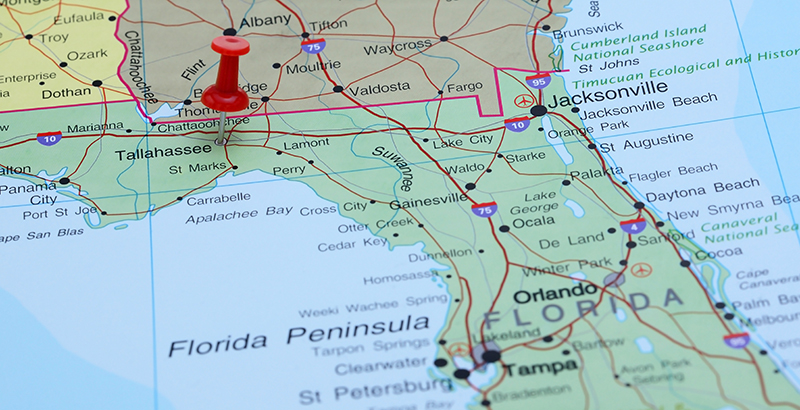And Then There Was One: 3 Things to Know About Florida’s Stalled Education Plan — and Why the State Could Be Risking $1 Billion in Federal Funds

Two weeks ago, on July 12, Secretary of Education Betsy DeVos approved the Every Student Succeeds Act (ESSA) plans submitted by California and Utah, leaving Florida as the last state awaiting approval for its proposed school accountability system under the nation’s new education law.
On first glance, Florida’s inability to win federal approval is puzzling. As the Tampa Bay Times’s Jeffrey Solochek points out, the Trump administration “has in many ways held up Florida’s education system as a model for the nation” and “hired many former Florida education officials to top jobs in its own education department.” DeVos even called Florida a “bright spot” this April in the context of this year’s “Nation’s Report Card” results.
So, what gives? One answer might be that the state didn’t follow the rules.
As Solochek reported in 2017, Florida’s Department of Education was quick to say it “would ask for permission to work around sections of the act it did not agree with.” But when the state submitted its initial draft plan to the U.S. Department of Education, state education officials “skipped the waiver requests, instead just writing its intentions into its plan and claiming it met the standards.”
Unsurprisingly, DeVos’s team sent it back with what was effectively an “incomplete” mark, telling the state that “it can’t simply adopt rules that run counter” to ESSA, “particularly without seeking waivers.”
Florida then submitted a revised ESSA plan in April 2018. But the most recent response from the U.S. Department of Education to Florida education officials was a June 5 status report, notifying the state that it “has not submitted a revised consolidated State plan that meets all the requirements of the ESEA and the McKinney-Vento Act.”
In other words: Insufficient.
As far as the feds are now concerned, the ball now seems to be in Florida’s court. For those tracking the writing and rollout of the new ESSA plans across the country, we’re left with three questions:
1 What does Florida need to fix?
The main points of disagreement between Florida education officials and their federal counterparts are provisions regarding English language learners and demographic-based student subgroups.
As Education Week’s Alyson Klein reported in May, Florida’s original plan “tried to stick as close as possible to the A through F grading system” the state had in place under a No Child Left Behind Act (NCLB) waiver, which “meant Florida didn’t want to rate schools on how well they help English-language learners achieve proficiency—an ESSA must.”
The state also sought continued use of a combined “super subgroup” that “considers the lowest-performing 25 percent of students in a school (no matter what their race, income, or disability status) rather then look at results for English-learners, students in special education, and racial minorities separately.” This is also now a no-no when it comes to ESSA, which requires states to account for subgroups when determining whether or not a school is “struggling” and in need of assistance.
Florida’s answer to these issues — as presented in its revised plan— was to develop a wholly separate “federal index” system for school ratings that does take English-language learners into account and would (along with the state’s in-place A-F system) identify struggling schools. The state also said it would take subgroup performance into consideration instead of focusing on just the bottom quarter of students in any given school.
As discussion continue between the Department and Florida education officials, no word yet on if — or how — these issues have been resolved.
2 Who else is objecting to Florida’s plan?
Federal officials haven’t been the only ones voicing concerns about the state.
Civil rights groups and other advocates have consistently called out Florida’s plan as problematic as well. Late last year, more than a dozen civil rights and education advocacy groups asked Secretary DeVos to reject Florida’s ESSA plan, stating in a letter to the education secretary that the plan is “a bad idea” and “doesn’t follow ESSA because it doesn’t offer state tests in languages other than English.”
In addition, they noted that the state’s proposal to exclude English-language proficiency in its accountability system is a major problem, and claimed the plan “doesn’t appropriately identify schools with low performance for student subgroups.”
3 What’s at stake?
“We’re still working with the feds,” Cheryl Etters, a spokeswoman for the state’s department of education, told Education Week recently. “As soon as we have something to share, I’ll be glad to let you know.”
But as Daarel Burnette II notes in the article, with ESSA “set to go into full effect this fall, advocates for the state’s large black and Latino community are worried that the state’s plan could be rejected in the weeks before school is set to open.”
Absent such approval, Florida “faces several sanctions,” including the federal government withholding more than a billion dollars in funding “to operate its department of education and distribute between its schools.”
So, while the federal government plots its next move, and continues to negotiate with Florida school officials, the education world will continue to watch… and wait.
Get stories like these delivered straight to your inbox. Sign up for The 74 Newsletter

;)